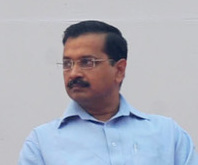Arvind Kejriwal
| Arvind Kejriwal | |
|---|---|
 |
|
| 7th Chief Minister of Delhi | |
|
Assumed office 14 February 2015 |
|
| Deputy | Manish Sisodia |
| Preceded by | President's Rule |
|
In office 28 December 2013 – 14 February 2014 |
|
| Preceded by | Sheila Dikshit |
| Succeeded by | President's Rule |
| Member of the Delhi Legislative Assembly for New Delhi | |
|
Assumed office 8 December 2013 |
|
| Preceded by | Sheila Dikshit |
| Personal details | |
| Born |
16 August 1968 Siwani, Haryana |
| Political party | Aam Aadmi Party |
| Spouse(s) | Sunita Kejriwal (m. 1995) |
| Children | 2 |
| Residence | New Delhi, India |
| Alma mater | IIT Kharagpur |
| Profession | Activist, politician |
| Known for |
India Against Corruption Jan Lokpal Bill |
| Religion | Hinduism |
| Awards | Ramon Magsaysay Award |
| Website | Official website |
Arvind Kejriwal (born 16 August 1968) is an Indian politician who is the Chief Minister of Delhi since February 2015. He previously served as Chief Minister from December 2013 to February 2014, stepping down after 49 days. He is the national convener of the Aam Aadmi Party. His party won the 2015 Delhi Assembly elections with a majority, obtaining 67 out of 70 assembly seats.
Kejriwal is a graduate of the Indian Institute of Technology Kharagpur, and worked in the Indian Revenue Service as a Joint Commissioner of the Income Tax Department in New Delhi.
In 2006, Kejriwal was awarded the Ramon Magsaysay Award for Emergent Leadership recognising his involvement in the grassroots movement Parivartan using right-to-information legislation in a campaign against corruption. The same year, after resigning from the IRS, he donated his Magsaysay award money as a corpus fund to found the Public Cause Research Foundation, a non-governmental organisation (NGO).
In 2012, he launched the Aam Aadmi Party, and the party won in the 2013 Delhi Legislative Assembly election. Following the election, he took office as the Chief Minister of Delhi on 28 December 2013. He resigned 49 days later, on 14 February 2014, stating he did so because of his minority government's inability to pass his proposed anti-corruption legislation due to a lack of support from other political parties.
On 14 February 2015, he was sworn in as Chief Minister for a second term after his party's victory in the Delhi Assembly election.
...
Wikipedia
